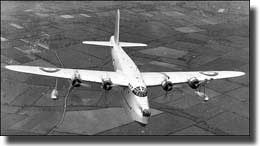|
"Australia" to the Rescue
In October, 1940, I was a Midshipman in H.M.A.S. "Australia" and we were working out of the Clyde in Scotland. On the afternoon of Monday, the 28th, we were sailed to join the search for a German merchant raider of the "Konigsberg" class of light cruiser, reported operating in the North Atlantic. We cleared the Clyde, and proceeded to our station at 26 knots, the glass was quickly falling, the weather getting worse, with a very heavy sea running.
Sunderland Flying Boat
 | On Tuesday morning we were directed to search for a Coastal Command Sunderland Flying Boat which had made a forced landing after running out of petrol. Visibility was poor, and it looked to be a difficult assignment, to find the Flying Boat in the appalling weather conditions that prevailed. The Sunderland transmitted on its radio so that we could search down the Directional Finding bearing. About noon we received a message "Hurry up, am breaking up." As we became closer to its estimated position, the ship made smoke at intervals, to allow the crew to sight the smoke.
"Australia" was making heavy weather of the conditions, but at 1435 (2.35 P M.) we sighted the Sunderland ahead, her tail occasionally visible above the huge waves, she was flashing a light to guide us, and appeared to be intact. When we were only half a mile away, one of the floats dropped off. A moment later an enormous wave picked up the Sunderland and turned it completely on its back, one man was clinging to the upturned hull.
We approached from windward to drift down on to the wreck. Having prepared ropes, jumping ladders, and a scrambling net over the Starboard side, we spotted a group of Airmen in the water with their life jackets on. When close to this group, ropes were passed to them, however their weakened state and the very cold water precluded them from securing a rope around themselves.
Commander Jamie Armstrong, and volunteer Officers and Sailors went over the side to secure a bowline around each Airman. It was a long, slow, rescue, to haul each man aboard ship. The ship was rolling fearfully, one moment the Starboard side would be many feet under the sea, and the next moment it would become a wall of steel, as we rolled heavily to Port. The crew's heavy water logged clothing made this task very difficult. I well recall that the first to be hauled over the Starboard side happened to be an Australian. His first words were" Survivor's leave for a week, that will do mel"
We rescued 9 Airmen, the remaining 4 all drifted past our bows, and all attempts to throw them a heaving line failed, as the gale force winds just hurled back our attempts. We kept up a search for the last 4 until 1725 (5.25P.M.) and abandoned it, knowing our failure to locate them meant a certain death.
We turned for the Clyde, and into the teeth of this Atlantic gale could only make 9 knots. By 0400 (4A.M.) on Wednesday morning, the barometer was at its lowest, reading only 974 millibars. We finally anchored in the Clyde on Thursday morning, and were able to land our Airmen in Scotland. The Sunderland had left its base at 1700 (5P M ) on Monday evening to go on patrol. It never did find the Convoy it was supposed to escort, and the weather became too bad for them to D/F their base for a course home. High winds caused them to run out of petrol, and forced them to ditch about 0700 (7A.M ) on Tuesday. They had been down for some 7.5 hours when we came on the scene, and all were sea sick.
In 1945 when "Australia" was arriving in U K. for repairs after her battering at Lingayen Gulf, when she collected 5 Kamikaze Aircraft on board in January that year, she was escorted into port by Sunderlands from the Squadron where our ditched Aircraft from 1940 had been based. It was a nice moment, "They had remembered."
next chapter
back to Under Water index
|